The Little Brown House on The Albany Road
|
parte." In its pages can be seen reflected the sentiment of the time, which ranked Napoleon as the most heartless and cruel despot the sun ever shone upon, and Alexander, the czar of Russia, as the friend of humanity and the prince of peace. It gives us queer notions of our democracy to see the emperor stigmatized in this production as "a mud sprung reptile," "a filthy toad," a "base born Corsican." This tragedy, which covered the leading events of the rise and fall of Napoleon, was put upon the boards and acted by the leading lights of Deerfield in the old meetinghouse, part of the pews being floored over for a stage. This was the event of that generation, and the assumed names
the actors clung to many of them through life. In my boyhood, the names of Blucher and Ney, Lescourt and Platoff were as familiar as household words.
This tragedy was evidently composed under the eye of General Hoyt, for his ear-marks can be seen on almost every page. The low ceiling of Aunt Spiddy's kitchen must have looked down a hundred times on the author and his fellows, as they spouted the lurid lines before the critic in rehearsal for the stage; and the copyist was doubtless often vexed by changes in the text in order to insert some new technical military phrase or let in a little more blood and thunder. How wide a circulation this historic effusion had is not known; but Horace Greeley relates that when an apprentice at Poultney, Vermont, the tragedy was acted there, and he personated one of the characters. In after years, President Hitchcock made efforts to suppress this callow effort of his genius, and copies are scarce in consequence. Under the lead of his uncle, young Hitchcock became an ardent student of astronomy and, making a practical application of his acquirements, constructed the astronomical tables for a series of almanacs which he published at Deerfield. Some of his problems were questioned by the astronomers of Europe; but with General Hoyt at his back he maintained his ground, and after a sharp contest his positions were at length admitted as proven by the Continental Magnates. Doubtless  Old-Time Cheer.
These pages are © Laurel O'Donnell, 2006, all rights reserved
Copying these pages without written permission for the purpose of republishing in print or electronic format is strictly forbidden This page was last updated on 11 Feb 2006 |
